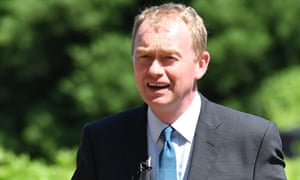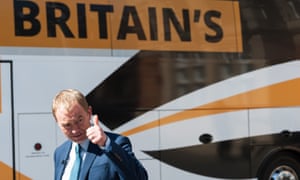Tim Farron has insisted he does not regret putting Brexit at the heart of his election strategy because it was “the right thing to do”, despite signs the Liberal Democrats are being squeezed in the polls.
Farron said that history would vindicate the party’s pro-European message and said his conviction on the issue would be proved right in the long term, even if Brexit was slipping from people’s minds ahead of the 8 June poll.
“I think it will win seats by the way, and we have seen progress, but my motivation is to a degree whether I can look my kids in the eye and say I did everything I could,” he said. “I don’t want to sound overconfident, but we will be proved right within two years. Hopefully, by 9 June. But if we are proved right, at the latest by 2019, then things can change, can’t they?”
A second referendum on Europe, which would be a choice between accepting a negotiated deal on withdrawal at the end of the process or remaining in the EU, is the cornerstone of the Lib Dem’s campaign.
However, though the party’s hard remain stance has been a motivator in affluent, pro-European seats such as Richmond Park, which the party won in a byelection last year, its poll rating has slipped back below double figures in recent weeks.
Nick Clegg, the party’s former leader and deputy prime minister, admitted last week it was “politically tough” for a pro-remain party in a climate where the result of referendum appeared to be slipping down voters’ agendas.
However, the Conservatives are expected to refocus their campaign on the Brexit negotiations and leadership in the final two weeks of campaigning, after the party plummeted in the polls following its manifesto launch.
Though the Lib Dems are optimistic about recapturing some seats such as Cambridge, Twickenham in south-west London, and even Vauxhall, held by the Labour Brexiter Kate Hoey, some of its nine MPs are also potentially at risk from Ukip voters returning to the Tories.
Those include the health spokesman, Norman Lamb, in North Norfolk and the foreign affairs spokesman, Tom Brake, in Carshalton and Wallington. The Lib Dems’ traditional heartland in the south-west, where almost all of its historically safe seats were lost to the Tories in 2015, voted heavily for Brexit.
Farron insisted his message was not exclusively targeted at dissatisfied remainers, which recent YouGov polling has suggested make up only a quarter of voters with the rest having accepted that Brexit was inevitable. Even leavers, he said, could be convinced that a final deal should be put to a vote.
“Leavers and remainers are more nebulous terms. There’s been a churn in both directions,” Farron said. “We are saying, ‘however you voted, let’s not fear the other side but look at what’s ahead, a deal we don’t know anything about yet’,” he said.
“And what does it mean for closure and democracy if we just end up having something imposed on us, which will be inevitably a Brussels stitch-up because they will have just as much say as our government? Then leavers will be as angry as remainers.”
Party insiders have suggested the campaign was struggling in places like Cornwall – which voted 56% for leave – because Ukip is not putting up a candidate against the Conservatives in many places.
“I think we are beginning to see with the polls, if they mean anything at all, that to assume the Ukip vote goes directly to the Tories is simplistic,” Farron said, citing voters’ concerns about the Tory manifesto, cuts to schools and the highly damaging “dementia tax” row over social care.
“You might think, ‘yeah let’s get out of Europe tomorrow’, but the worst thing for you and your family is that manifesto of meanness,” he said. “The most impotent creature in the House of Commons is a backbencher of a government with a big majority. You want someone with vim and verve and independent spirit.”
Farron, who himself has been dogged by stories about his past opposition to abortion and his stance on homosexuality as a committed Christian, said he took his party’s poll rating with “a pinch of salt” and said he was cautious about ascribing too much meaning to national vote share.
Labour has slashed the Conservatives’ lead over the past month, with some polls showing just six points between the parties.
Farron said Labour MPs were “leakier than a leaky sieve” and his party had seen internal projections that put Labour 58 seats down. “It does look like Labour are stacking up votes in places where they don’t actually need them,” he said.
Regardless of any Labour surge, Farron has said he will not take the Lib Dems into a coalition. “No deals, no pacts with anyone. It’s important to have that clarity,” he said. “We think people should know when they vote Lib Dem that they are not doing it as a proxy for anybody else.”
Farron said he would not consider a deal, even if he was to be offered the second referendum his party craves. “You can find ways that are powerful and effective in opposition to extract significant change,” he said. “It doesn’t mean you can’t use your position in parliament in order to get what you want in a parliament where there’s no clear majority.”
Clegg has suggested Farron’s hardline stance on coalition or deals between progressive parties may need to be revised after the election, particularly under a new Labour leader. “I am self-evidently a pluralist – why else would I go into coalition?” he told the New Statesman last week.
“I’ll always be happy to play my part in doing what I think is right, which is that we need a proper anti-Conservative force or forces in British politics.”
Farron said it was “important to work across party boundaries,” though he added that he did not expect the Labour leader, Jeremy Corbyn, to resign after the next election: “I’d put money on him if he wants to stay on.”
However, he said, there were Labour politicians – perhaps future leaders – whom he admired. “I’ve got a lot of time for Sadiq Khan, I like Yvette Cooper, I like Andy Burnham. I like [the Green party leader] Caroline Lucas as well, and some people who are sensible in the Tory party, too,” he said.
“I’m happy to work with all of them, but this election reminds you the best thing for progressive politics in this country is for the Lib Dems to be resurgent. There’s only one flank where Theresa May is vulnerable, that’s the Lib Dems. So from a progressive point of view, the most useful thing I can do is to make sure I build the strength of the Lib Dems.”




0 comments:
Post a Comment